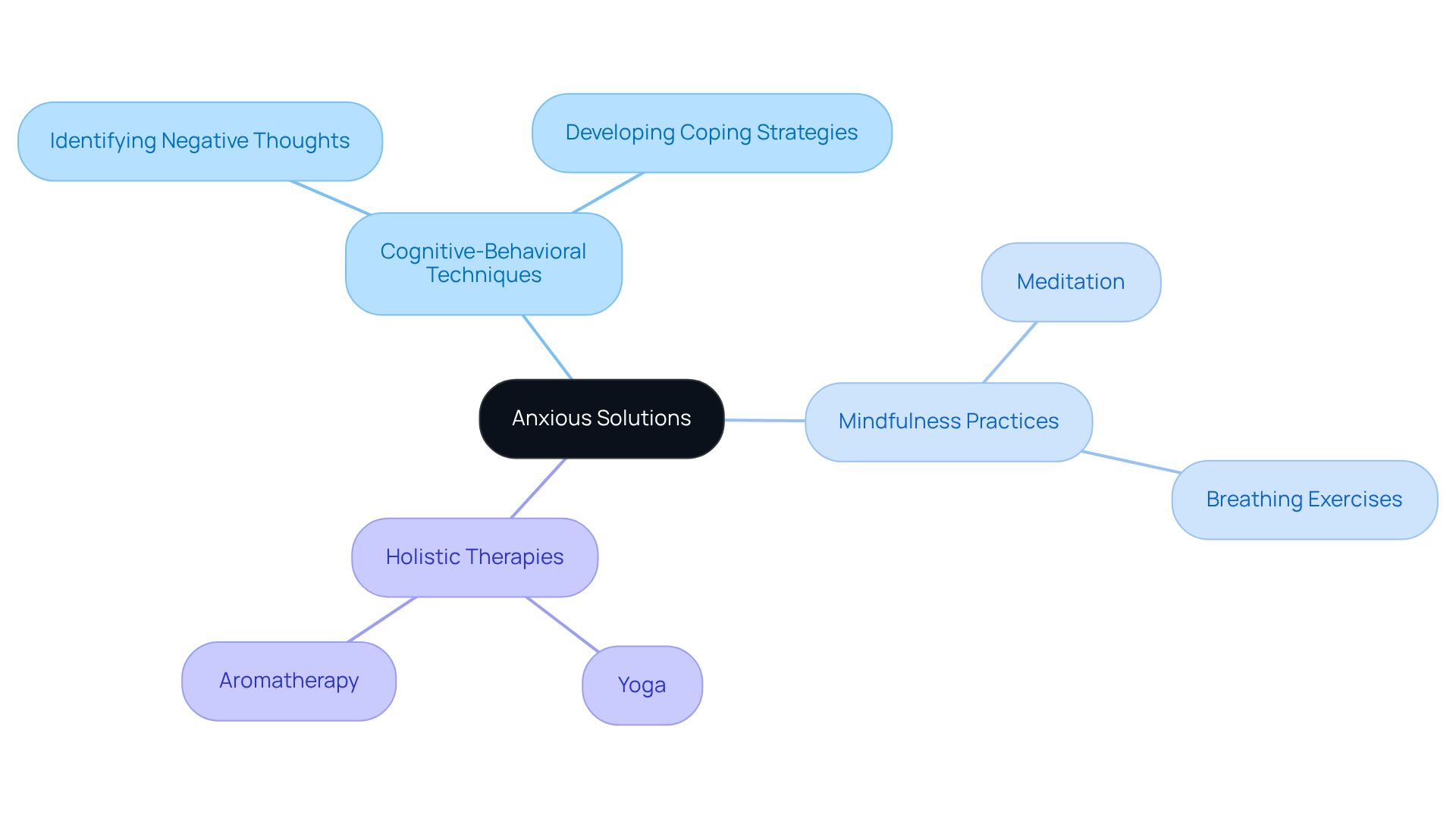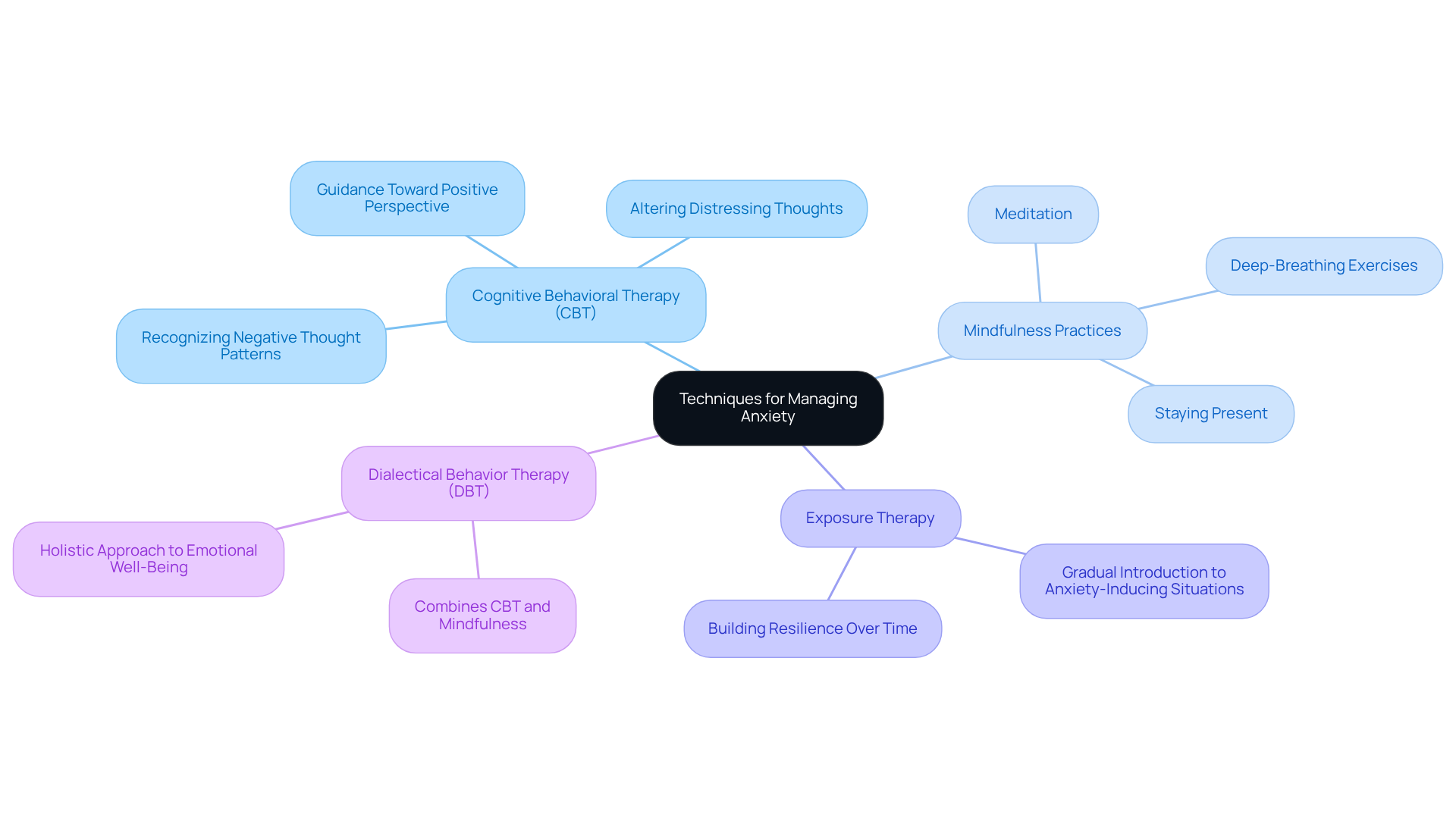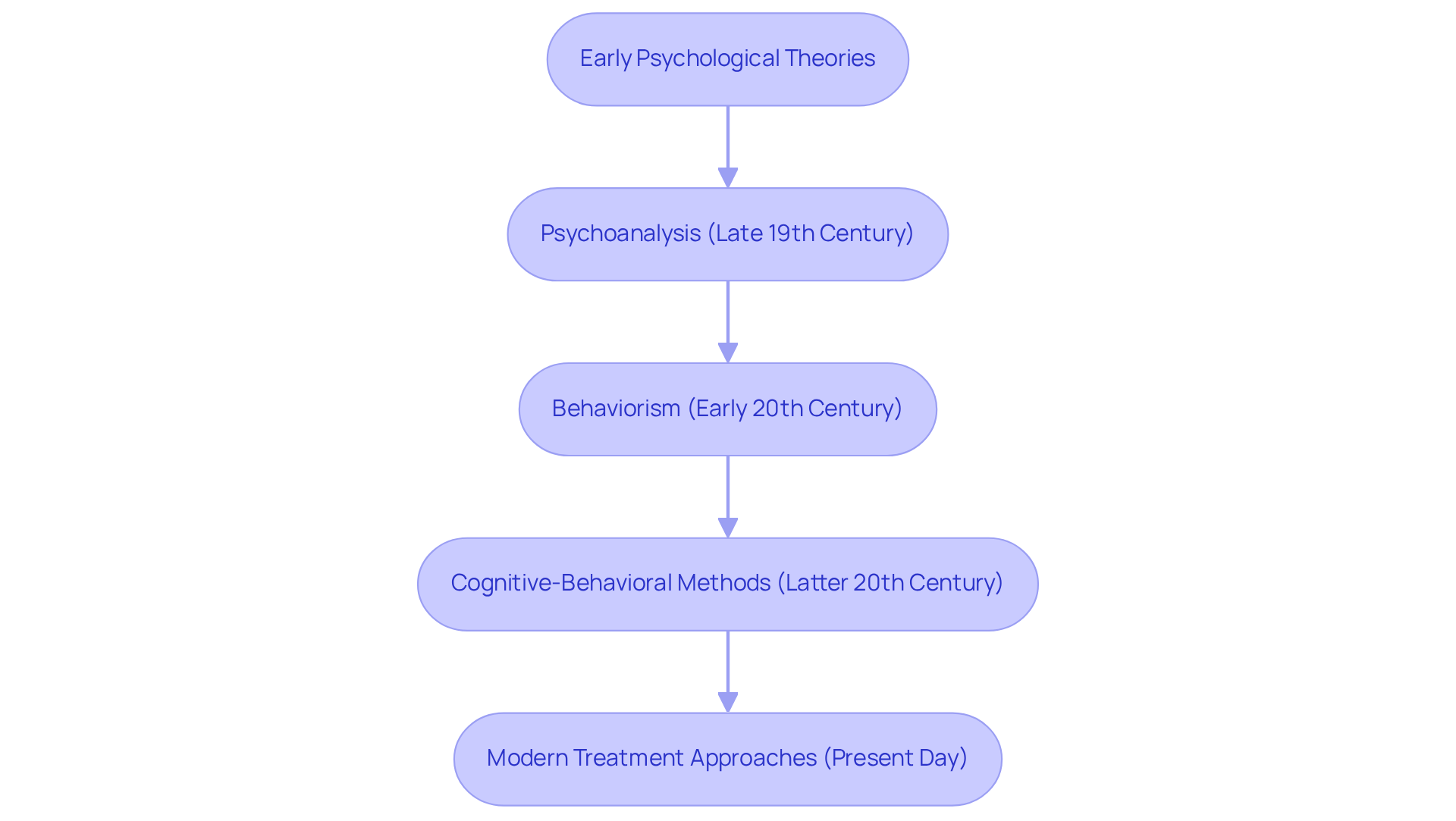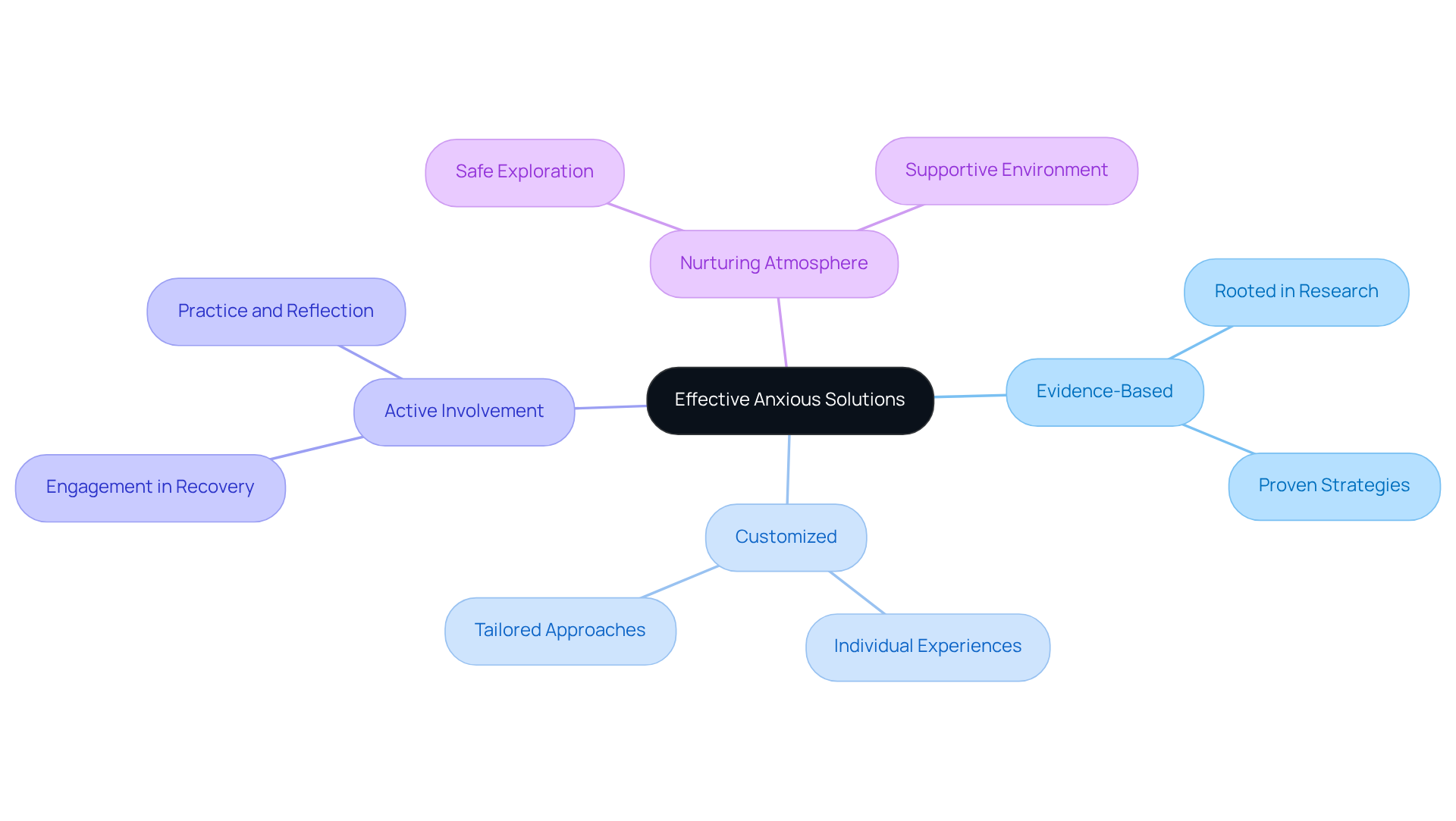Overview
This article gently explores anxious solutions—therapeutic methods crafted to alleviate stress and nurture mental health. Have you ever felt overwhelmed by your worries? It’s important to recognize that effective support is available. The focus here is on evidence-based, customized, and actively engaging approaches, such as cognitive-behavioral therapy and mindfulness practices. These methods empower individuals to manage anxiety effectively, fostering a sense of well-being and peace.
As we delve deeper, we see how these therapeutic techniques can transform lives. They offer not just relief from anxiety, but also a pathway towards personal growth and resilience. By embracing these practices, you can take meaningful steps toward improving your overall mental health. Remember, seeking help is a sign of strength, and you deserve to feel supported on your journey.
In addition to this, it’s essential to recognize that you are not alone in this experience. Many individuals find comfort and healing through these therapeutic avenues. The journey may seem daunting, but with the right tools and support, it can lead to profound change. Taking the first step towards therapy can be a powerful decision in reclaiming your life and well-being.
Introduction
Nervous approaches to mental health have garnered significant attention as many individuals seek compassionate ways to manage stress and anxiety. By exploring various therapeutic methods—from cognitive-behavioral techniques to holistic practices—these solutions empower people to reclaim their well-being.
Yet, with so many strategies available, how can one discern which methods truly resonate and foster lasting change? Have you ever felt overwhelmed by your past? Delving into the origins, characteristics, and effectiveness of these anxious solutions reveals not only their historical significance but also the transformative potential they hold for those navigating the complexities of mental health.
As we explore this further, it becomes clear that understanding these approaches can be a crucial step towards healing.
Define Anxious Solutions: Key Concepts and Importance
Nervous approaches encompass a variety of therapeutic methods and interventions designed to alleviate stress symptoms and enhance mental health. These strategies include:
All aimed at nurturing your well-being. The importance of these approaches lies in their ability to empower individuals to manage stress effectively, fostering resilience and improving overall quality of life.
Have you ever felt overwhelmed by stress? By exploring anxious solutions, you can take proactive steps toward your mental well-being, recognizing that stress is a common experience that can be addressed through informed strategies. Together, we can toward healing.

Explore Techniques for Managing Anxiety: From Cognitive Behavioral Therapy to Mindfulness
Managing stress can feel overwhelming, but there are multiple anxious solutions available that can genuinely assist. One of the most studied techniques is (CBT), which focuses on recognizing and altering negative thought patterns that may lead to distress. Have you ever found yourself caught in a cycle of negative thinking? CBT can guide you toward a more positive perspective.
In addition to CBT, mindfulness practices, such as meditation and deep-breathing exercises, encourage you to remain present. These techniques serve as anxious solutions to alleviate anxiety and promote a sense of calm. Imagine taking a moment to breathe deeply, allowing your worries to fade away.
Other valuable methods include:
- Exposure therapy, which gently introduces you to anxiety-inducing situations, helping you build resilience over time.
- Dialectical behavior therapy (DBT), which combines cognitive-behavioral techniques with mindfulness strategies, offering a holistic approach to emotional well-being.
Each of these methods provides unique benefits, allowing you to choose the approach that serves your anxious solutions best.
As you explore these options, remember that seeking help is a courageous step toward healing. You deserve support and understanding on your journey to managing stress effectively.

Trace the Origins of Anxious Solutions: Historical Context and Evolution
The origins of anxious solutions can be traced back to early psychological theories and practices, which offer a basis for understanding the distress that many individuals experience. In the late 19th and early 20th centuries, psychoanalysis introduced concepts of the unconscious mind and its influence on behavior. This laid the groundwork for recognizing how our past shapes our present. As psychology progressed, behaviorism emerged, focusing on observable actions and leading to the development of effective methods such as exposure therapy. Have you ever felt overwhelmed by your past? Studies reveal that over 50% of phobias can be linked to traumatic events, emphasizing the importance of understanding the roots of anxiety.
As we explore this further, the latter part of the 20th century witnessed the rise of cognitive-behavioral methods, which beautifully combined cognitive theories with behavioral practices. Research by Benjamin et al. (2008) demonstrated significant improvements in patients treated with SSRIs like paroxetine, underscoring the effectiveness of modern treatment approaches. Today, solutions that are anxious continue to evolve, incorporating insights from neuroscience and holistic practices. This reflects a more comprehensive understanding of mental health, inviting us to consider various paths to healing.
Consider the case of Laura, an 8-year-old girl who showed marked reductions in avoidance behaviors after cognitive-behavioral therapy. Her story illustrates the practical application of these techniques and the potential for transformation. This evolution highlights the necessity for a , one that embraces both psychological and holistic perspectives. If you or someone you know is struggling, remember that seeking help is a courageous step towards healing.

Identify Key Characteristics of Effective Anxious Solutions: What Works and Why
Effective solutions that are anxious embody several key characteristics that can truly make a difference in your journey.
- Firstly, they are evidence-based, rooted in research that highlights their effectiveness in alleviating distressing symptoms. Have you ever wondered about the science behind the methods you encounter? This foundation ensures that you are supported by proven strategies.
- Secondly, these solutions are customized, recognizing that each individual's experience with anxiety is unique. It's important to acknowledge that your path may differ from others, and tailored approaches can make all the difference.
- In addition to this, efficient methods encourage active involvement, motivating you to engage in your recovery journey through practice and reflection. How empowering it is to take an active role in your healing!
- Finally, they cultivate a nurturing atmosphere, whether through therapy or self-help groups, where you can feel safe to explore your emotions and experiences. This is crucial for fostering lasting change.
These characteristics ensure that solutions for anxiety not only address your symptoms but also empower you to achieve meaningful transformation in your life.

Conclusion
Nervous solutions play a pivotal role in enhancing mental well-being by providing individuals with effective strategies to manage stress and anxiety. Have you ever felt overwhelmed by your emotions? By understanding these approaches, you can take proactive steps toward emotional health, recognizing that stress is a shared human experience that can be addressed with informed techniques.
As we explore this further, the article delves into various methods such as Cognitive Behavioral Therapy (CBT), mindfulness practices, and holistic therapies. Each of these offers unique benefits tailored to individual needs. It highlights the evolution of these solutions from early psychological theories to modern evidence-based practices, underscoring the importance of a multifaceted approach to stress management. Key characteristics of effective anxious solutions include:
- Their evidence-based nature
- Customization to individual experiences
- Active involvement in recovery
- The nurturing environments they create for healing
Ultimately, embracing these anxious solutions is not just about alleviating symptoms; it is about empowering you on your journey toward resilience and improved quality of life. By exploring these techniques and recognizing their importance in mental health, you can take significant strides toward understanding and managing your anxiety. Seeking help is a courageous step, and it opens the door to transformative healing and personal growth.
Frequently Asked Questions
What are anxious solutions?
Anxious solutions refer to a variety of therapeutic methods and interventions designed to alleviate stress symptoms and enhance mental health.
What types of techniques are included in anxious solutions?
Anxious solutions include cognitive-behavioral techniques, mindfulness practices, and holistic therapies.
Why are anxious solutions important?
These approaches are important because they empower individuals to manage stress effectively, fostering resilience and improving overall quality of life.
How can exploring anxious solutions help individuals?
Exploring anxious solutions allows individuals to take proactive steps toward their mental well-being and recognize that stress is a common experience that can be addressed through informed strategies.




